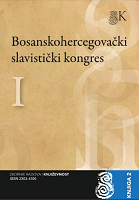Prostor kasabe kao semiotički prostor u romanu Ive Andrića, pripovijeci Zije Dizdarevića i putopisu Zuke Džumhura
Space of Kasaba as a Semiotic Space in Ivo Andrić’s Novel, Zija Dizdarević’s Short Story and Zuko Džumhur’s Travelogue
Author(s): Dijana HadžizukićSubject(s): Comparative Study of Literature, Bosnian Literature, Culture and social structure , Theory of Literature, Stylistics
Published by: Slavistički komitet BiH
Keywords: Ivo Andrić; Zija Dizdarević; Zuko Džumhur; kasaba; town; novel; short story; travelogue;
Summary/Abstract: This paper analyses the role of a town (often marked as kasaba in Bosnian-Herzegovinian culture) within the structure of Ivo Andrić’s novel The Bridge over the Drina, Zija Dizdarević’s several short stories and Zuko Džumhur’s travelogues. The town / kasaba, whose architecture is based on ancient and Mediterranean concepts, has a center and an edge. Center symbolizes sociality, while the edge, with a great number of public places, doesn`t have that meaning. Various meanings and functions of the town / kasaba are found in mentioned works of Ivo Andrić, Zija Dizdarević and Zuko Džumhur. Some of them are highly symbolical. The town / kasaba is the crucial element in the inner structure of those works, seen also as the place of historical and cultural remembrance. Seen through narrator’s eyes, town often symbolizes social backwardness, which is best known stereotype about town (kasaba).
Journal: Bosanskohercegovački slavistički kongres
- Issue Year: I/2012
- Issue No: 2
- Page Range: 275-281
- Page Count: 7
- Language: Bosnian

